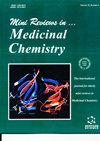基于纳米粒子的神经退行性疾病基因疗法
IF 3.3
3区 医学
Q2 CHEMISTRY, MEDICINAL
引用次数: 0
摘要
::由于大脑面临错综复杂的障碍以及基因干预的多面性,神经系统疾病给现代医学带来了严峻的挑战。这篇综述文章深入探讨了基于纳米粒子的基因疗法这一前景广阔的领域,将其作为解决错综复杂的神经系统疾病的一种创新方法。纳米颗粒(NPs)为治疗基因的传递提供了一个多用途平台,具有精确靶向、增强稳定性等独特性能,并有可能绕过血脑屏障(BBB)的限制。本报告全面探讨了纳米粒子介导的神经系统疾病基因疗法的现状,重点介绍了最新进展和突破。文章讨论了用各种材料合成纳米粒子并将其与治疗基因连接的过程,强调了设计的灵活性有助于实现特定组织靶向。摘要还讨论了这些纳米颗粒的低免疫原性及其在循环中的稳定性,这些都是成功传递基因的关键因素。虽然基于 NP 的神经系统疾病基因疗法潜力巨大,但挑战和知识差距依然存在。由于缺乏广泛的临床试验,有关安全性和潜在副作用的问题仍未得到解答。因此,本摘要强调有必要开展进一步研究,以验证 NP 介导的基因疗法的治疗应用,并解决纳米安全性问题。总之,基于纳米粒子的基因疗法在寻求神经系统疾病的有效治疗方法方面前景广阔。本摘要主张继续开展研究工作,弥补现有的知识差距,充分挖掘这种创新方法的潜力,为神经系统健康领域的变革性解决方案铺平道路。本文章由计算机程序翻译,如有差异,请以英文原文为准。
Nanoparticle-based Gene Therapy for Neurodegenerative Disorders
:: Neurological disorders present a formidable challenge in modern medicine due to the intricate obstacles set for the brain and the multipart nature of genetic interventions. This review article delves into the promising realm of nanoparticle-based gene therapy as an innovative approach to addressing the intricacies of neurological disorders. Nanoparticles (NPs) provide a multipurpose podium for the conveyance of therapeutic genes, offering unique properties such as precise targeting, enhanced stability, and the potential to bypass blood-brain barrier (BBB) restrictions. This comprehensive exploration reviews the current state of nanoparticle-mediated gene therapy in neurological disorders, highlighting recent advancements and breakthroughs. The discussion encompasses the synthesis of nanoparticles from various materials and their conjugation to therapeutic genes, emphasizing the flexibility in design that contributes to specific tissue targeting. The abstract also addresses the low immunogenicity of these nanoparticles and their stability in circulation, critical factors for successful gene delivery. While the potential of NP-based gene therapy for neurological disorders is vast, challenges and gaps in knowledge persist. The lack of extensive clinical trials leaves questions about safety and potential side effects unanswered. Therefore, this abstract emphasizes the need for further research to validate the therapeutic applications of NP-mediated gene therapy and to address nanosafety concerns. In conclusion, nanoparticle-based gene therapy emerges as a promising avenue in the pursuit of effective treatments for neurological disorders. This abstract advocates for continued research efforts to bridge existing knowledge gaps, unlocking the full potential of this innovative approach and paving the way for transformative solutions in the realm of neurological health.
求助全文
通过发布文献求助,成功后即可免费获取论文全文。
去求助
来源期刊
CiteScore
7.80
自引率
0.00%
发文量
231
审稿时长
6 months
期刊介绍:
The aim of Mini-Reviews in Medicinal Chemistry is to publish short reviews on the important recent developments in medicinal chemistry and allied disciplines.
Mini-Reviews in Medicinal Chemistry covers all areas of medicinal chemistry including developments in rational drug design, synthetic chemistry, bioorganic chemistry, high-throughput screening, combinatorial chemistry, drug targets, and natural product research and structure-activity relationship studies.
Mini-Reviews in Medicinal Chemistry is an essential journal for every medicinal and pharmaceutical chemist who wishes to be kept informed and up-to-date with the latest and most important developments.

 求助内容:
求助内容: 应助结果提醒方式:
应助结果提醒方式:


